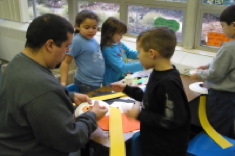If your program for families has been centered on a few tried-and-true events you rarely vary over the years, you might want to mix it up with a new event or two this year to see how it changes your attendance and outreach. Traditions are wonderful, and I’m not knocking them—I know I look forward as a parent to the fall open house, the winter concert, and the spring book sale. But a new format can lead to something so successful it sparks a new tradition in your classroom or school, and builds a stronger home-school connection. Here are a few suggestions:
Family Game Night
Family nights centered on curricular areas like literacy or math are popular, but sometimes can be inhibiting for family members who have limited English language proficiency or harsh memories of their own days in school. A simple “Family Night” or “Family Game Night” that includes common games families already know or some enjoyable craft activities is an alternative to nights with a clear curriculum focus. Stations can be set up with checkers, Monopoly, Scrabble, building blocks, and art supplies—along with simple placards at each station that highlight the different “literacies” that are developed through the activity (e.g., spatial intelligence development through the building blocks station; economic awareness through Monopoly).
“First Day” Celebrations
“First Day” events are growing in popularity across the country. Tied to the first day of school in local communities, they can be simple affairs or elaborate collaborations between local businesses, schools, and service organizations. If you are launching a new family outreach program, First Day celebrations are a wonderful way to bring in many parents and other community members to the school to fill out informational surveys and become familiar with the school and its literacy goals.
Readers’ Teas
Fall and spring are great times for readers’ teas—a chance for students to share what they have been reading with their families in a gracious, genteel discussion group. There is just something about a cup of tea, hot or cold, that brings out a kinder, gentler atmosphere. Teas are particularly popular with grandparents—you might try a “grandparents-only” program, enlisting “foster grandparents” from local seniors groups to befriend children who don’t have grandparents in the local area.
Cultural Cookout
Have families bring a dish that represents their culture, as well as the recipe. Recipes can then be collected in a class or school recipe book illustrated by students, or doled out in a weekly newsletter throughout the entire year.
Community Cleanup
Bring families together to clean up the school grounds, plant flowers in the spring, add fresh paint to classrooms, or start a recycling program. The cleanup can be combined with reading, writing, and information—link the flower planting with a presentation by a local commercial gardener or someone from the local cooperative extension service; have someone from the recycling center explain where and how recycled materials are used.
Authors’ Fair or Poetry Coffeehouse
Young writers read aloud and display their publications, always to the delight of their families. You might also invite a local author to meet families and sign books. This is a good event to tie to a family book exchange, with parents and children contributing books already read (or outgrown as a child ages) that can be traded for titles from other families.
Monthly Content Connections Night
Conduct monthly evening workshops across the content areas to include a read-aloud, activity, and books for students to take home. For example, for a focus on good health and fitness, the physical education teachers might engage all attendees in exercises that could be done at home. A read-aloud could be part of the night’s schedule, followed with students taking home The Busy Body Book by Lizzy Rockwell (author and illustrator).*
*Many thanks to Patsy Grimes for this suggestion.





